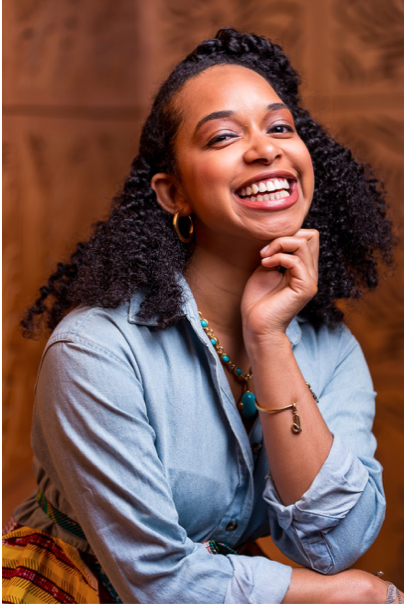By: André Solomon
Our nineteenth installment features Christina Eskridge and ChelseaDee Harrison, with our host Courtney J. Boddie from the Teaching Artistry with Courtney J. Boddie Podcast, who center storytelling as a device towards authentic transparency.
You told your story, now what? If this were the Registry of Multiple Voices (RMV), the enormous waiting period might cause one to give up. Artists constantly use their medium to expressive themselves, however, the feedback lacks. The very reason why Christina Eskridge decided to create Elevate Theatre Company, to explore health and wellbeing through storytelling. Here the artist creates the expression, the audience is invited and both are provided expertise and information on what to do next with the feelings presented. By supplying experts to audiences it can dissolve damaging narratives, which these very narratives constructed by our white counterparts suffocate marginalized communities.
Courtney resonates on the notion that anti-racism is embedded in the various concepts we fight for; the foundation. A foundation that inspires several BIPOC individuals, as it has done for ChelseaDee Harrison. Harrison uses Black Excellence, a term inherited by Dr. Goldy Muhammad, as a way to combat racism. Black excellence ultimately acts as a way to celebrate the positive significance the Black community has provided within society. Instead automatically thinking about the negatives towards the community, shift the narrative to hone in on the positives that this group brings to the table.
Due to our skewed society that perpetuates and upholds whiteness as the ideal, we often do not see the excellence of BIPOC, moreso individuals who need saving. The parental oversight that exists with white individuals to educate BIPOC individuals is real, but the ones “educating” usually lack the empathy to understand the root causes for hardship in these communities. We hear phrases, such as “They don't know what is best for them…”, that describe unequal relationships. The reality is that the people closest to the problem are the closest to the solution, so listen to them. Unfortunately, white supremacy has clouded our judgement on alternative ways of being.
With transparency as the driving force, we can start empowering ourselves towards action. But first we need to acknowledge where we are and learn from the marginalized how they are thriving; a perspective needed for the new normal.
Join us next week for our last episode when Courtney interviews Idris Goodwin, a multidisciplinary arts leader and creative community builder.
Christina D. Eskridge is the Founder and Executive Director of Elevate Theatre Company. Pulling from her background as a performing artist, teaching artist and public health professional, holding a Master’s Degree in Public Health from UC Berkeley, Christina is working to fuse her two passions of health and theater together. Christina believes live theater is a healing tool, ripe with opportunity and has created Elevate to provide space for audiences and artists to explore health and well-being through the art of storytelling. Checkout the upcoming Elevate Winter Series events on the Elevate website: www.ElevateTheatreCompany.com
ChelseaDee is a creative envisionist. An actor, culture-bearer, storyteller. A theater-maker, dancer, writer, and proud Womanist-history enthusiast. A complicator of dominant historical narratives and a teaching artist. A Trickster facilitator, curriculum-creator, and public programmer. Most recently, a director, producer/project manager, pleasure activist, and curator.
Follow her on Instagram
-
Solomon, A. (2020, December 8). Where does Anti-Racism Live in Your Practice? Creative Generation Blog. Creative Generation. Retrieved from https://www.creative-generation.org/blogs/where-does-anti-racism-live-in-your-practice


